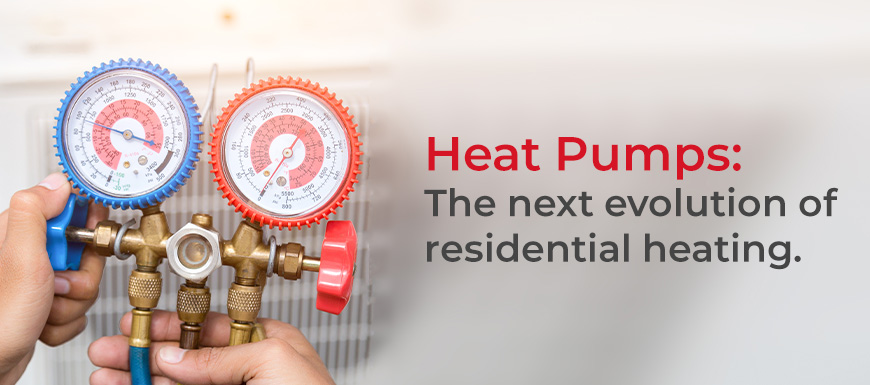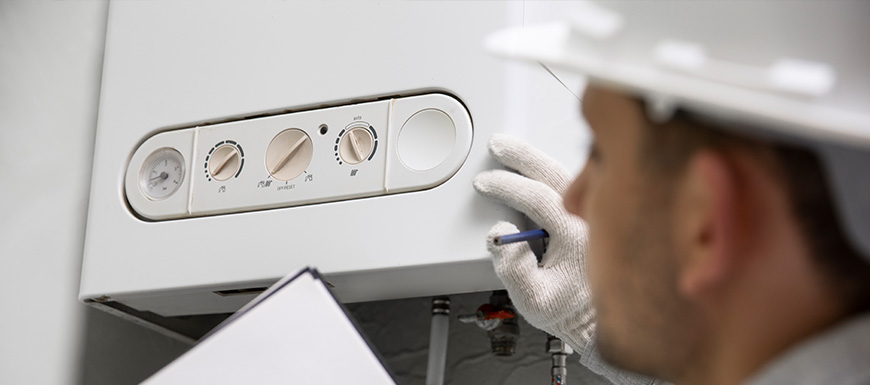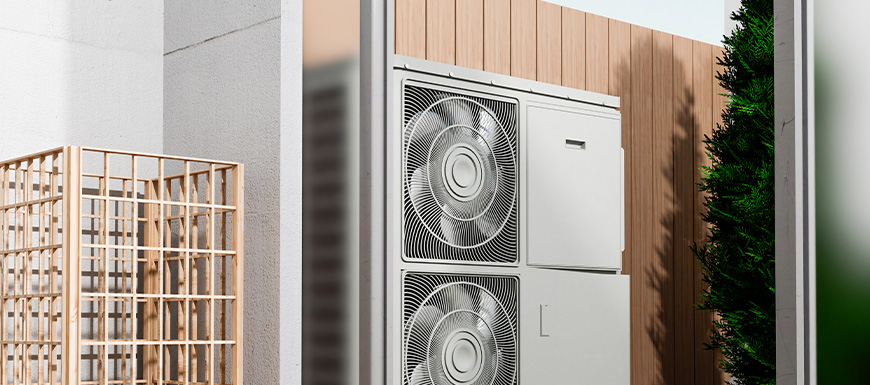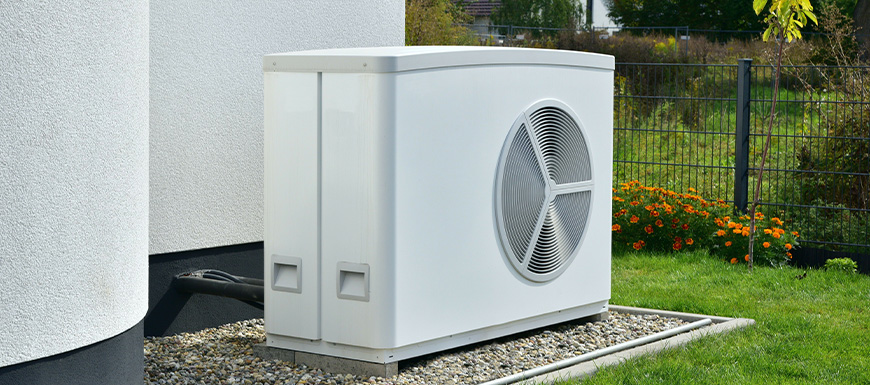
If you are on the verge of replacing that gas furnace in your basement or even a few years out: STOP. A new gas furnace is no longer the only option to heat your home. Make way for the heat pump, a more efficient, sustainable and price insulated way to keep your family warm.
The need to move away from fossil fuels and reduce our greenhouse gas emissions has never been greater. Around the world, heat is responsible for nearly half of all the energy we use and 40% of energy-related carbon dioxide emissions.
Did you know that heat pumps currently available to us in Canada are three-to-five times more efficient than natural gas? And do you want to know what the real kicker is? Many heat pump systems can replace your air conditioner too! One system to heat and cool your home. By 2050 there will be 2.6 billion people living in regions that require both residential heating and cooling. This makes heat pump technology a game changer.
As countries commit and move to climate-neutral energy for residential and commercial heating and cooling, the heat pump is slowly replacing fossil-fueled powered systems. Last year roughly 10% of space heating was generated by heat pumps globally. You can expect to see this grow rapidly in the coming decades, in fact global sales grew almost 15% in 2021, double the average of the last decade.
As the technology improves these systems can also work in colder climates like Canada. The International Energy Agency has some insightful market statistics from around the world:
Norway has 60% of its buildings equipped with heat pumps.
Sweden and Finland have over 40%.
In 2022 the European Union saw around a 35% growth in the heat pump market.
China (not surprisingly) continues to be the biggest country for new sales.
North America is leading the world with the largest number of homes with heat pumps in 2022.

Heat pumps work on electricity and are in concept, very similar to a refrigerator. Transferring heat from a cool space to a warm space, making the cool space cooler and the warm space warmer. During the winter a heat pump will move heat from outside into your home; during the summer it will move heat from your home to the outside. Heat pumps transfer heat, they don’t generate it making the process very energy efficient and not reliant on fossil fuels (depending on the system you choose.) With natural gas prices ever increasing this is an important benefit. For people living in the GTA, Enbridge gas rates have more than doubled in price in the past two years, from 10 cents per cubic metre to 23 cents per cubic metre. With increasing pressure to move away from fossil fuels, gas prices are only going to continue to rise.
There are three main types of heat pumps on the market and some additional options to work specifically with your home and climate. Here’s a general breakdown of the offerings.
As the most common, air-source heat pumps transfer heat between your house and the outside air. The pump draws heat from the air, transporting it to the refrigeration substance inside the outside unit of the system. Here the air is compressed to increase the temperature and then the refrigeration fluid is moved to the inside unit of the system and pushed through the ductwork of your home. These can work alone or in a hybrid system. A hybrid system works well as a new installation or as a good replacement for central air conditioning. Here the air-source heat pump works alongside your furnace or boiler.

If you do not have a duct system, then you would need to look at a ductless air-source heat pump or what’s called a mini-split heat pump. These systems work well with hydronic (hot water heat), radiant panels, and space heaters fuelled by wood, kerosene or propane. Just like their duct friendly cousins, these systems have two main units: an outdoor compressor/condenser and an indoor air-handling unit.
It’s strange to think but even when temperatures are very cold outside there is still a good deal of energy available to heat your home. For instance, if its -18 degrees Celsius outside this equates to 85% of the heat contained at 21 degrees Celsius. This means there is still a considerable amount of heat for an air source pump to access even during Canadian winters. It’s no wonder then this type of heat pump is the most popular in Canada with over 700,000 units across the country.
Geothermal heat pumps transfer heat into your house from the ground or a water source. Did you know the temperature below ground remains around 12-13 degrees Celsius all year? This means there is energy and heat right below your feet to keep your home comfortable.
Geothermal systems have three main parts: a ground loop, a heat pump, and a distribution system.
The ground loop is buried on your property. It can be a closed loop or an open loop that uses nearby water.
The heat pump exchanges heat from the air and the ground loop system.
Finally, the distribution system is how the air (cool or hot) is moved throughout your house. This can be done through ductwork or a hydronic distribution – piping filled with fluids that run throughout your home to carry heat energy.
Geothermal systems are a more expensive option and require a certain amount of space on your lot, depending on whether you go with a horizontal or vertical loop. But they are more efficient and robust. One of the big advantages of a geothermal heat pump is they are not impacted by extreme temperature changes since they use the ground or water as a constant temperature source. This can reduce your energy use by 30-60% and make them ideal in more extreme climates.

Absorption heat pumps are newer to the residential market and essentially work like an air-source heat pump but instead of using electricity to as a power source it is supported by a heat source like gas, propane, solar heated water or geothermal-heated water. These pumps use an absorption cycle instead of a vapor-compression cycle and are a more cost-effective choice when electricity is difficult to access or extremely expensive.
Let’s recap all the benefits a heat pump can bring to your home.
Heat pumps can be all electric and do not have to rely on fossil fuels. They are a cleaner and greener alternative to a furnace or boiler.
Using electricity as a main power source, heat pumps create less greenhouse gas emissions, especially in Ontario where electricity is primarily clean, produced by hydro, nuclear and wind power.
Heat pumps are energy efficient. In fact, it’s been shown that heat pumps can provide more than 3X the heating energy output for the same energy consumption than their furnace and boiler counterparts.
Carbon pricing and a global push to move away from fossil fuels means natural gas rates will continue to rise. Heat pumps work well with new Canadian electricity pricing structures, especially if we see reductions in time-of-use rates.
Heat pumps use less space indoors. A furnace needs at least 30 inches of clearance on all sides and are usually found in basements. Heat pumps only require 24 inches of clearance on all sides and are installed outside. Keep in mind a traditional air-source heat pump system will still need an indoor air handler unit called a fan coil.
Governments are incentivizing heat pumps with low-interest financing through the:
Home Energy Loan Program
Canada Greener Homes Grant

If you are considering one of the many options of heat pumps don’t wait till your furnace or AC unit kicks the bucket. Start planning now.
Do more research!
Look into rebate programs.
Book a home energy assessment with a certified auditor. The more energy efficient your home is the better. This will also help guide you in choosing what type of heat pump your home needs.
Assess your electricity service. Do you need to upgrade to 200 amps?
Find contractors like Advance Heating and Cooling in your area and start getting quotes.
Make no mistake a heat pump is an up-front investment that will bring you savings down the line. Depending on what type of heat pump system you choose you can expect it to last 15 years if well maintained. If your environmentalist and looking to reduce your reliance on fossil fuels, this is the residential system for you.
